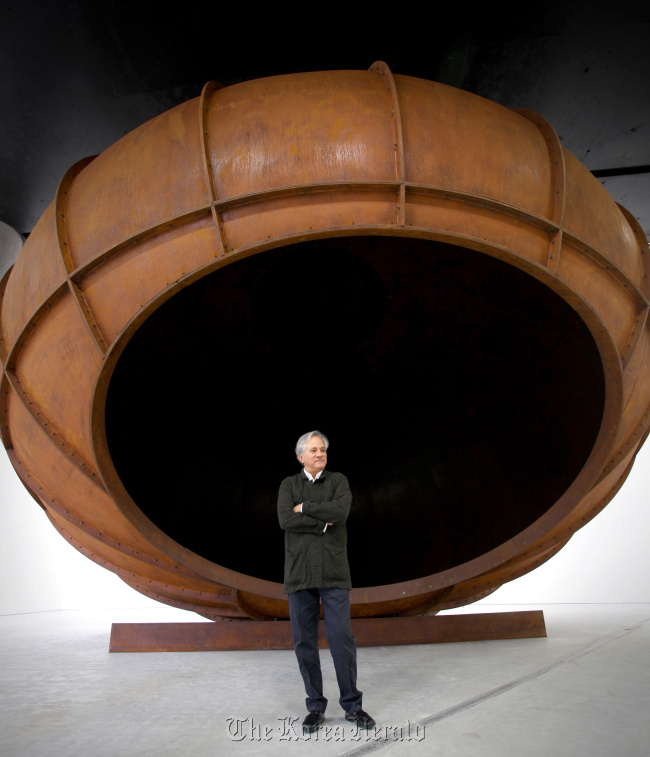Leeum, Samsung Museum of Art, presents the country’s first exhibition of works by British sculptor Anish Kapoor. The first major show by Kapoor in East Asia, the exhibit encompasses the artist’s major works from the early years of his career to the present.
Known to the general global audience as the creator of the giant red steel “Orbit” tower in London Olympic Park, Kapoor has enjoyed great success, holding a solo exhibition at London’s Royal Academy of Arts as the first living artist in 2009.
Kapoor, born in Mumbai in 1954, rose to stardom in the global art scene with his bright pigment-coated sculptures in the 1980s that challenged limits of sculpture. He continues to challenge traditional concepts of sculpture, presenting large-scale sculptures with unfathomable holes, three-dimensional monochromic paintings and stainless-steel sculptures that reflect or deconstruct images.
The exhibition at Leeum offers an extensive tour of the artist’s major works created during his 30-year artistic career and his endeavors to create a mystical world with art.
On the first floor, there is ambiguously shaped objects covered with pigment powders in vibrant colors, which spill onto the floor around the objects. Inspired by vibrant colored pigments he saw at Hindu temples in India during his travel in 1979, Kapoor started the pigment series in an attempt to break boundaries of sculptures.
 |
Anish Kapoor stands in front of his work “Untitled.” (Leeum) |
“Sculptures are separate from the ground, but with the pigments, the sculptures are extended to the ground,” said Tae Hyun-sun, the show curator.
The Pigment series led the artist to an exploration of space and form in the Void series.
The concave, dome-like structure coated with deep blue pigments creates unfathomable depth, overwhelming the viewers with both depth and scale.
His Void series incorporated with painting result in a three-dimensional version of huge monochromic paintings. When it is incorporated with architecture, it creates an endless dark space. “The Earth,” which appears to be painted on the floor, looks like infinite space when examined closely.
Kapoor said he has always explored the world beyond material and mystical world of art.
And surprisingly, his philosophical ideas are generated from his own studio.
“I am very much of a studio artist. It’s where every thing happens, where things go wrong and sometimes right. And it’s a physical process. Sometimes in the physical process, some ideas emerge. For me, it was the idea of non-object, the idea of generated objects and etc.,” Kapoor said at the news conference on Tuesday.
“My Red Homeland” is a part of his generated object series in which a massive hammer scrapes the surface of red wax that continuously changes the form of the sculpture.
His other interest is reflection using concave mirrors.
Outside in the museum garden sits the large stainless-steel sculpture “Tall Tree and the Eye,” which replaced the French sculptor Louis Bourgeois’ “Maman.“
“I’ve made the series of ‘Void’ works and felt that it would be possible to make mirrored objects that are void,” said Kapoor.
In contrast to the colored sculptures, he uses mirrors to reflect images endlessly or distort and deconstruct viewer’s visual space.
“My real adventure with mirrored objects is concave and negative objects. I am interested in them because they are not mirrored spaces. They are spaces full of mirrors just like ‘Void’ works. A space full of mirrors ― that is the part of the mirrored objects that I am interested in,” said Kapoor.
The exhibition continues through Jan. 27, 2013 at Leeum, Samsung Museum of Art, in Seoul. Admission is 8,000 won for adults, 5,000 won for students. For more information, call (02) 2014-6900.
By Lee Woo-young (
wylee@heraldcorp.com)






![[Herald Interview] 'Trump will use tariffs as first line of defense for American manufacturing'](http://res.heraldm.com/phpwas/restmb_idxmake.php?idx=644&simg=/content/image/2024/11/26/20241126050017_0.jpg)
![[Exclusive] Hyundai Mobis eyes closer ties with BYD](http://res.heraldm.com/phpwas/restmb_idxmake.php?idx=644&simg=/content/image/2024/11/25/20241125050044_0.jpg)
![[Herald Review] 'Gangnam B-Side' combines social realism with masterful suspense, performance](http://res.heraldm.com/phpwas/restmb_idxmake.php?idx=644&simg=/content/image/2024/11/25/20241125050072_0.jpg)